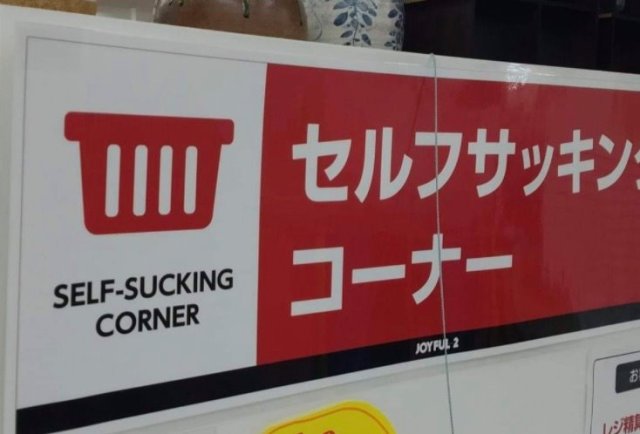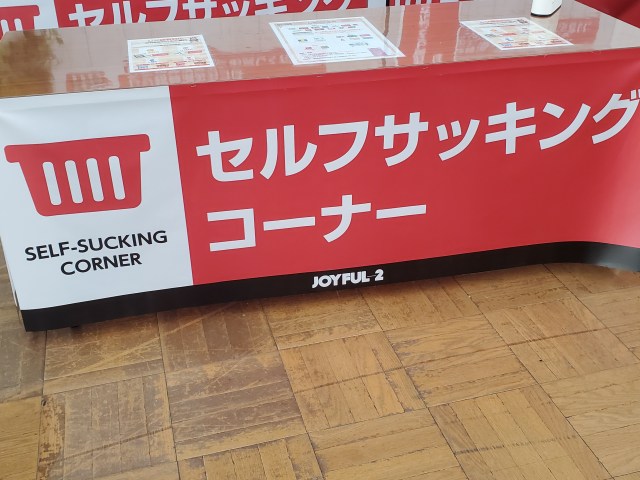
This isn’t the type of self-service they were meaning.
Japan is scattered with well-intended English-language signs that contain seemingly obvious translation mistakes, with even big companies like Pizza Hut and Osaka Metro proving that the simplest of messages run the risk of becoming lost in translation.
These “Engrish” mistakes, as they’re known, often make native English speakers smile, but one recent find had people blushing in embarrassment instead. That’s because a chainstore in Japan decided it was okay to display this:

That’s right — a section of the Arakawaoki branch of the Joyful 2 hobby specialty store, located at Tsuchiura in Ibaraki Prefecture, had a sign that read “Self-Sucking Corner“. And that’s not the only branch where the sign was displayed, as it was also photographed at the chain’s Chiba New Town branch in Inzai, Chiba Prefecture.
Image: Blain Armstrong
While the English sign was intended as a nice gesture designed to help English-speaking customers, it no doubt left them scratching their heads instead. While “self-sucking corner” gives a whole other meaning to “Joyful 2”, the actual act of self-sucking in a corner of the store would be legally off-limits, and likely physically impossible, so what were they really aiming to convey with this sign?
The reason for the mistake is revealed in the katakana message printed next to it, which reads phonetically as “self-sacking corner“. The problem occurs with the word “サッキング”, as the (sa) sounds similar to the “su” in the English word for “suck”, so much so that a search for “サッキングパッド” (read phonetically as “sacking pad“) on Google will take you to “sucking pads”, a product designed to be added as an attachment to baby carriers for babies to suck on.
With the katakana word for “sack” being used to mean “suck” in some cases, and “sack” at other times, the confusion between the two words becomes understandable. Still, the store sign was so noteworthy for its hilarious mistake that it even made its way to Japanese sites, where Japanese commenters had a laugh at the sign as well.
“So…what happens if I self-suck at the self-sucking corner?”
“My body isn’t supple enough for this store.”
“Mistaking “u” and “a” can make a huge difference!”
“Businesses should really avoid posting signs they don’t understand themselves!”
“It’s hard to tell the difference in pronunciation between ‘sucking’ and ‘sacking’.”
It’s true that these small nuances in pronunciation make it difficult for Japanese speakers to differentiate between the two words, especially when it comes to speaking and listening. It’s one of the many reasons why Engrish exists and continues to this day, even creating blunders that include making Kyoto the enemy of the world. Oops!
Source: Hachima Kikou
Featured image: Pakutaso
Insert images used with permission
● Want to hear about SoraNews24’s latest articles as soon as they’re published? Follow us on Facebook and Twitter!


 Engrish sign at the Tokyo Olympics turns out to be hilariously accurate
Engrish sign at the Tokyo Olympics turns out to be hilariously accurate English mistake makes Kyoto the enemy of the world
English mistake makes Kyoto the enemy of the world The reason why Japanese students don’t pronounce English properly
The reason why Japanese students don’t pronounce English properly The fish in rural Fukui that rivals Japan’s most auspicious sea bream
The fish in rural Fukui that rivals Japan’s most auspicious sea bream Which convenience store onigiri rice balls are the most popular? Survey reveals surprising results
Which convenience store onigiri rice balls are the most popular? Survey reveals surprising results Japanese restaurant chain serves Dragon Ball donuts and Senzu Beans this spring
Japanese restaurant chain serves Dragon Ball donuts and Senzu Beans this spring Tokyo street sweets: The must-snack treats of Nakano’s Refutei
Tokyo street sweets: The must-snack treats of Nakano’s Refutei Japan Extreme Budget Travel! A trip from Tokyo to Izumo for just 30,000 yen [Part 2]
Japan Extreme Budget Travel! A trip from Tokyo to Izumo for just 30,000 yen [Part 2] Starbucks Japan releases first-ever Hinamatsuri Girls’ Day Frappuccino
Starbucks Japan releases first-ever Hinamatsuri Girls’ Day Frappuccino Starbucks vs. two popular Japanese coffee shops: Where can you get the most bang for your buck?
Starbucks vs. two popular Japanese coffee shops: Where can you get the most bang for your buck? As more foreign visitors visit Kyoto’s top sights, Japanese travelers increasingly staying away
As more foreign visitors visit Kyoto’s top sights, Japanese travelers increasingly staying away Our reporter tries nuikatsu for the first time, but is he too old for this otaku lifestyle hobby?
Our reporter tries nuikatsu for the first time, but is he too old for this otaku lifestyle hobby? Ju-On’s mother and son monsters start Instagram account, show what they do when not busy haunting
Ju-On’s mother and son monsters start Instagram account, show what they do when not busy haunting Highest Starbucks in Japan set to open this spring in the Tokyo sky
Highest Starbucks in Japan set to open this spring in the Tokyo sky The 10 most annoying things foreign tourists do on Japanese trains, according to locals
The 10 most annoying things foreign tourists do on Japanese trains, according to locals Tokyo Skytree turns pink for the cherry blossom season
Tokyo Skytree turns pink for the cherry blossom season Yakuzen ramen restaurant in Tokyo is very different to a yakuza ramen restaurant
Yakuzen ramen restaurant in Tokyo is very different to a yakuza ramen restaurant Shibuya Station’s Hachiko Gate and Yamanote Line stairway locations change next month
Shibuya Station’s Hachiko Gate and Yamanote Line stairway locations change next month Starbucks Japan releases new sakura goods and drinkware for cherry blossom season 2026
Starbucks Japan releases new sakura goods and drinkware for cherry blossom season 2026 Starbucks Japan adds new sakura Frappuccino and cherry blossom drinks to the menu
Starbucks Japan adds new sakura Frappuccino and cherry blossom drinks to the menu Japan Extreme Budget Travel! A trip from Tokyo to Izumo for just 30,000 yen [Part 1]
Japan Extreme Budget Travel! A trip from Tokyo to Izumo for just 30,000 yen [Part 1] Japan’s new “Cunte” contact lenses aren’t pronounced like you’re probably thinking they are
Japan’s new “Cunte” contact lenses aren’t pronounced like you’re probably thinking they are Japan’s newest Shinkansen has no seats…or passengers [Video]
Japan’s newest Shinkansen has no seats…or passengers [Video] Foreigners accounting for over 80 percent of off-course skiers needing rescue in Japan’s Hokkaido
Foreigners accounting for over 80 percent of off-course skiers needing rescue in Japan’s Hokkaido Super-salty pizza sends six kids to the hospital in Japan, linguistics blamed
Super-salty pizza sends six kids to the hospital in Japan, linguistics blamed Starbucks Japan unveils new sakura Frappuccino for cherry blossom season 2026
Starbucks Japan unveils new sakura Frappuccino for cherry blossom season 2026 Foreign tourists in Japan will get free Shinkansen tickets to promote regional tourism
Foreign tourists in Japan will get free Shinkansen tickets to promote regional tourism Take a trip to Japan’s Dododo Land, the most irritating place on Earth
Take a trip to Japan’s Dododo Land, the most irritating place on Earth Naruto and Converse team up for new line of shinobi sneakers[Photos]
Naruto and Converse team up for new line of shinobi sneakers[Photos] Is China’s don’t-go-to-Japan warning affecting the lines at a popular Tokyo gyukatsu restaurant?
Is China’s don’t-go-to-Japan warning affecting the lines at a popular Tokyo gyukatsu restaurant? Survey asks foreign tourists what bothered them in Japan, more than half gave same answer
Survey asks foreign tourists what bothered them in Japan, more than half gave same answer Japan’s human washing machines will go on sale to general public, demos to be held in Tokyo
Japan’s human washing machines will go on sale to general public, demos to be held in Tokyo Starbucks Japan releases new drinkware and goods for Valentine’s Day
Starbucks Japan releases new drinkware and goods for Valentine’s Day We deeply regret going into this tunnel on our walk in the mountains of Japan
We deeply regret going into this tunnel on our walk in the mountains of Japan Studio Ghibli releases Kodama forest spirits from Princess Mononoke to light up your home
Studio Ghibli releases Kodama forest spirits from Princess Mononoke to light up your home Major Japanese hotel chain says reservations via overseas booking sites may not be valid
Major Japanese hotel chain says reservations via overseas booking sites may not be valid Put sesame oil in your coffee? Japanese maker says it’s the best way to start your day【Taste test】
Put sesame oil in your coffee? Japanese maker says it’s the best way to start your day【Taste test】 No more using real katana for tourism activities, Japan’s National Police Agency says
No more using real katana for tourism activities, Japan’s National Police Agency says